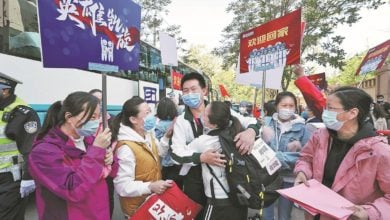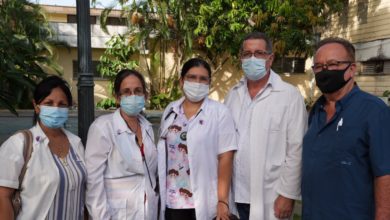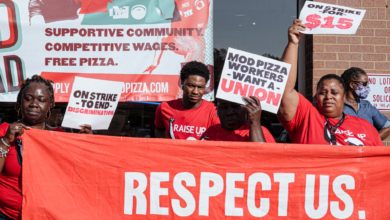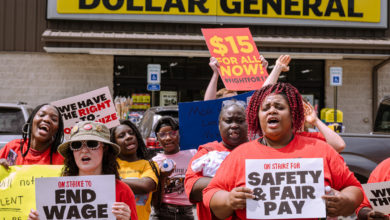In early March, South Carolina’s governor Henry McMaster ordered all state agency directors to submit plans for bringing state employees back for in-person work at 100% capacity. This, like much of McMaster’s criminal negligence during the pandemic, has been met with resistance.
State employees themselves questioned the governor’s decision to transition back to 100% in-person work. One worker called the decision, “irresponsible and rushed.” Only about 25% of South Carolina’s population is fully vaccinated at this point.
The South Carolina ACLU filed a lawsuit asking for the governor’s orders to be halted on the grounds that it exceeds his authority and unnecessarily puts non-essential workers and their families at higher risk of infection. The court denied that request but ACLU plans to appeal.
One thing is certain: every action McMaster has taken since the pandemic began has been to support and push forward the interests of the state’s big business at the expense of the health of workers.
A week after the state’s first reported COVID case on March 5, 2020, the governor called a state of emergency and over the next three weeks he went on to close schools and dine-in service for restaurants and bars, but only partially closed retail stores and non-essential businesses—leaving most open.
A few more were closed in April 2020, with the addition of travel and boarding restrictions in “high-risk” areas. It was not until well over a month after McMaster’s initial state of emergency declaration that the state government finally closed ALL non-essential business/retail stores, along with a “Home or Work” order that restricted travel to that necessary for getting essential services and going to work at an essential workplace. All of this was absurdly short lived.
As cases steadily climbed—going against logic—McMaster announced plans for ALL retail stores to reopen by April 21, 2020. Then in early May, he lifted the “home or work” order. The following week, he allowed for indoor dining and the reopening of public boat landings. By the end of May 2020, we saw a complete reopening of all “close-contact provider” services—barbershops, gyms, salons and so on.
In the early months of the pandemic, McMaster’s administration created a task force called “accelerateSC.” The task force was mostly constituted of business owners, CEOs and politicians—people who produce nothing and whose lives were slightly inconvenienced by the pandemic at most. The only damage they were concerned with mitigating was to their profits. It is these people who were given the power to make literal life and death decisions for South Carolina’s workers.
The task force of 20-plus members had only two physicians. There were no nurses or “front line” workers, but the group included a CEO of a pharmaceutical company. There were no factory or plant workers but there was the co-owner of a food manufacturing plant. There were no waiters, line cooks, dishwashers, or hotel workers, but the lead chair of the South Carolina Restaurant and Lodging Association was among the 20.
McMaster has also done little to hide his disdain for the state’s public school teachers. In June 2020, he attempted to allocate $32 million from the CARES act to private schools, even going so far as to praise these schools for having in-person learning five days a week. This move was shot down by the state’s supreme court for being in direct violation of the state’s constitution—which prohibits using public funds “for the direct benefit of private schools.”
To add insult to injury, during the first phase of the vaccine rollout in February, McMaster, along with the state superintendent, called for school districts to present plans to return teachers to face-to-face learning—while simultaneously not including teachers in the list of workers in occupations that would be vaccinated first! He justified this by saying that schools were not “at-risk environments:” a blatant lie. The teachers have only recently become eligible to receive the vaccine.
The number of COVID cases from April to July 2020 show how each action, or rather inaction, of McMaster contributed to the increased transmission of the virus, and hundreds of preventable deaths. The number of cases spiked from 124 on average per week in April to over 1,500 on average per week in July. Over 9,500 people in South Carolina have died from COVID thus far.
At first glance, one might look at McMaster’s actions as that of an incompetent or foolish individual in leadership. This would be a mistake. McMaster’s actions are calculated to keep the flow of profits into the hands of the state’s ultra-wealthy uninterrupted.
It is no coincidence that McMaster rescinded the dine-in service ban for restaurants and bars just in time for tourist season.
Working class people in South Carolina should really ask who benefited the most from McMaster’s actions? The workers who over a year later still face eviction and unemployment? Or the owners whose wealth grew during the pandemic?
The capitalist system is not incapable of addressing the pandemic, because there is no fundamental scarcity of resources. But the capitalist political leadership in South Carolina has shown it is unwilling to act in our interests — and that is to blame for the preventable death and suffering of thousands of working people.






